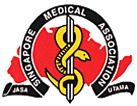
THESMANEWS
Present Issue
Past Issues
Journals
Present Issue
Past Issues
Letters to the Editor

![]()
This site is supported by Health ONE
"“Medical education is a continuum which begins in medical school and which extends for the life-time of the individual doctor’s career.” _ Prof Tan Chorh Chuan
APPOINTMENT OF ASSOCIATE DEANS
A landmark in medical education in recent years was the appointment of four Associate Deans, Mr Low Boon Yong, Clinical Associate Professor Ho Nai Kiong, Clinical Associate Professor Charles Ng and Clinical Associate Professor Low Cheng Hock. The ceremony to mark the appointment was held on 15 July 1998 at the Clinical Research Centre.
Strong emphasis on clinical skills
In his opening address the Dean of Medicine of NUS, Professor Tan Chorh Chuan said, "A major strength of the British medical education system, on which our undergraduate medical course is based, is the very strong emphasis on the development of good clinical skills. One of the central objectives of our medical school is that the medical student should be trained to a level where he can consistently make good clinical diagnoses of his patients’ problems through the competent application of the basic of history-taking and physical examination. In this context, laboratory investigations are used mainly to confirm or exclude the likely clinical diagnoses and to guide management. This approach has been adopted by our Faculty of Medicine since its inception, but with the continuing tendency to "high-tech" medicine world-wide, it is imperative that the emphasis on clinical training of medical students is consciously strengthened. Clinical skills can only be taught by precept and example, through guided interactions with patients and through bedside instruction by experienced clinicians. In this regard, medical students have, for many years, benefited from clinical postings to the various restructured hospitals, where they are exposed to a wide range of patients and clinical teachers. However, a number of factors have underlined the need for better coordination of such clinical teaching."
Vertical integrationHe went on to say, "One of the main objectives of the Faculty’s current curriculum review is the vertical integration of teaching so that instruction in key curricular strands is coordinated within the time frame of the 5-year course. A critical success-factor for such a Faculty-directed programme is a common understanding and implementation of defined educational objectives by individual tutors teaching at different sites. In the context of clinical teaching, this will necessitate the recognition, through the Faculty of Medicine’s revised Clinical Faculty Scheme, of a discrete pool of dedicated clinician-teachers who have well-defined commitments to undergraduate education, and who would conduct clinical teaching within the agreed framework of educational objectives. The process of educational quality assurance which is being further strengthened within the University would also need to extend to clinical teaching at all sites. This is particularly important as the tendency to subspecialisation and the pressures of modern-day clinical practice are likely to have an increasing impact on the priority accorded to the teaching of medical students in public hospitals. Undergraduate medical education is ultimately the responsibility of the Faculty of Medicine. However, the appointment of the Associate Dean is an important step forward in further enhancing the clinical training for medical students, by establishing a structure for improving the coordination and implementation of clinical teaching programmes and to assure the quality of clinical teaching. In addition, through the respective Associate Deans, the Faculty of Medicine would also be able to obtain the input of doctors in the restructured hospitals to the undergraduate medical programme as a whole."
A continuumHe concluded by saying, "Medical education is a continuum which begins in medical school and which extends for the life-time of the individual doctor’s care. As key components of the medical education system, the Faculty of Medicine and University are also committed to work towards the further improvement of postgraduate medical training, within the national framework. It is envisaged that the close working relationship between the Faculty and the Associate Deans will be one more factor which will help us achieve our ultimate goal, ie. to provide Singapore with doctors with a high level of clinical competence, with practice grounded on solid scientific and ethical foundations, who have the habit of life-long learning and who would treat their patients with respect and compassion."